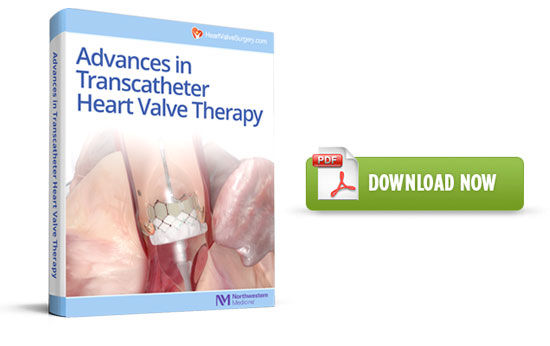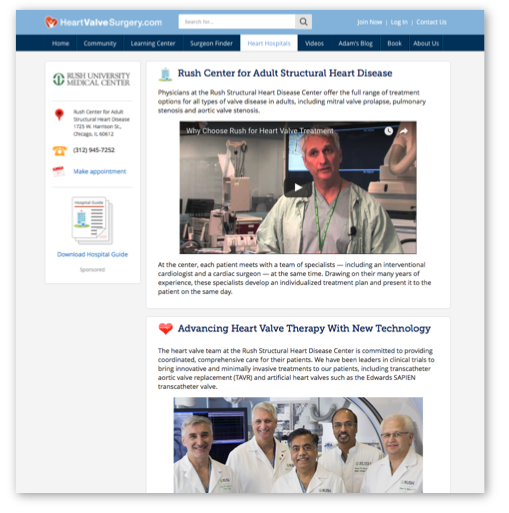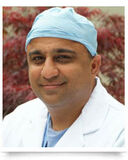Adam's Heart Valve Surgery Blog – Page 25
Jimmy Kimmel Opens Up About His Newborn Son’s Heart Valve Surgery
By Adam Pick on May 4, 2017
As a dad… As a heart valve patient… I need to say “Thank You!” to Jimmy Kimmel for sharing this emotional and inspirational story about Billy, his newborn son.
Many, many, many, many thanks to Dr. Vaughn Starnes (who performed my surgery) and Dr. Evan Zahn for taking such great care of the Kimmels!
Keep on tickin’ Billy!
Adam
Technology Update: The “Forgotten Valve” Gets New Feasibility Study!
By Adam Pick on April 19, 2017
We’ve talked about how the tricuspid valve is often referred to as the “forgotten valve” within cardiac care. At the same time, we’ve also learned that the treatment of tricuspid valve regurgitation is on the rise — either as a stand-alone therapy or combined with a mitral valve procedure.
That said, I was really interested to learn about a new transcatheter technology that is being used in the SCOUT feasibility study to treat tricuspid regurgitation. To learn more, I sat down with Dr. Charles Davidson who is the Clinical Chief of Cardiology at Northwestern Medicine. Here are the highlights from my interview with Dr. Davidson about this new technology.
Pretty neat, right? I guess this is one more piece of evidence that the use of transcatheter technologies is going to continue across the aortic, mitral, pulmonary and tricuspid valves. The possibilities are very, very, very exciting.
A First… We’re On Boomer TV! Thanks Steve!
By Adam Pick on March 30, 2017
This is completely unexpected and amazing! Our website was just mentioned in an interview with Steve Nicklin, a heart valve patient from Washington DC, who had successful surgery with Dr. Marc Gerdisch in Indiana. (So you know, Dr. Gerdisch has treated many patients from our community.)
You might recall that we posted a picture of Steve at our Facebook page immediately following his surgery. To see what happened next, watch Steve’s video.
On behalf of our community, I can’t thank Steve enough for sharing his story, his emotions and his success story in this interview. While it’s neat that Steve mentioned us in the video, I’m much more happy knowing that Steve is doing great after heart surgery. Also… Many, many, many thanks to Dr. Gerdisch, Nicole, Tara and Vanessa for taking such great care of Steve.
Keep on tickin’ Steve!
Adam
Surgeon Q&A: What Should Patients Know About The New Class I AFib Ablation Recommendation?
By Adam Pick on March 30, 2017
As up to 35% of patients with heart valve disease also have atrial fibrillation (an irregular heartbeat), I needed to make sure you knew about this.
It was recently announced that AFib ablation, a procedure for treating AFib during valve surgery, was just promoted to a Class 1 Recommendation by the Society of Thoracic Surgeons in their newly published 2017 guidelines. This is really big news for patients because we have learned that many times AFib is not always properly treated during heart valve procedures.
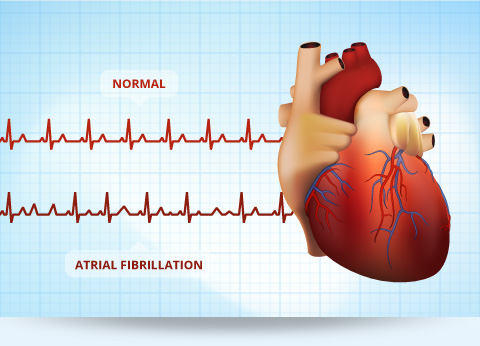
To learn more about this development, I reached out to Dr. Gorav Ailawadi. So you know, Dr. Ailawadi is a heart valve and AFib specialist at Michigan Medicine in Ann Arbor, Michigan. I’ve been fortunate to see Dr. Ailawadi operate before. He’s not only a great guy but many patients from this community have had excellent results with Dr. Ailawadi. 🙂
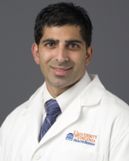 Dr. Gorav Ailawadi – Heart Surgeon
Dr. Gorav Ailawadi – Heart Surgeon
Patient Update: Orest Kozinczuk Applauds New TMVR Feasibility Study!
By Adam Pick on March 22, 2017
Heart valve surgery is in a renaissance. During the last 10 years, we’ve seen an emergence of new techniques, new surgical valves, new transcatheter devices and new tissue technologies. To evaluate the safety and the effectiveness of each valvular advance, clinical trials are going on — right now — all over the world. While participating in a research study is not for everyone… Many patients are seeing positive benefits for themselves and for the next generation of patients.
A great example of this is Mr. Orest Kozinczuk from Wheaton, Illinois. Orest suffered from severe mitral regurgitation. He was tired and short-of-breath. Reflecting on his quality-of-life with mitral regurgitation, Orest told me, “My life was going down the drain.” As Orest was at high-risk for a traditional open heart procedure, Orest didn’t have many options. Then, Orest heard about a feasibility study for a new transcatheter mitral valve replacement (TMVR). This is Orest’s story.
I am so happy for Orest who is such an exceptional person. It was great spending time with him — learning about his time in the Ukraine, his career as an electrical engineer, and his inventions. Interestingly, Orest reminded me A LOT of my Grandpa Zim. Many thanks to Orest for taking the time to share his story with our community!!!
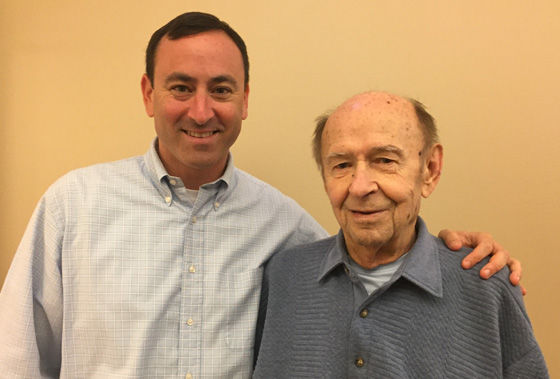
1st Heart Valve Disease Awareness Day Starts Now!!!
By Adam Pick on February 22, 2017
Did you know that only 60% of people have heard of heart valve disease?
At the same time… Over 12% of the population, aged 75 years or older, have heart valve diseases including aortic stenosis and mitral regurgitation. YIKES!!!
It is for this and SOOOOOOOOOO many other reasons that I am excited to share that today, February 22, 2017, is the first-ever National Heart Valve Awareness Day!!! Watch this video to learn more!!!
10 Years & 3 Heart Procedures Later, Paul Celebrates His Transcatheter Mitral “Valve-in-Valve” Replacement
By Adam Pick on February 5, 2017
At the age of 57, Paul Powers had actively pursued a healthy mitral valve for the past 10 years. During that time, Paul had BOTH mitral valve repair and mitral valve replacement procedures. Unfortunately, Paul recently began to feel short of breath and completely fatigued as his bio-prosthetic valve began to fail.
As Paul did not want to go through another open heart procedure — given the trauma and surgical risk — Paul looked for an alternative approach to fixing his valve. That is when Paul learned that a transcatheter mitral “Valve-In-Valve” replacement might do the trick. This is Paul’s story…
I have to admit… I had no idea that a transcatheter mitral “Valve-In-Valve” was even possible — until I met Paul. That said, thanks so much to Paul for sharing his story with me and our community. Also, I would like to extend a special thanks to Dr. Chris Malaisrie and the Northwestern team for taking such great care of Paul!
Doctor Q&A: When Can I Return to Normal Activity After Heart Surgery?
By Adam Pick on January 13, 2017
It is one of the best and most common questions I receive from patients. That fantastic question is, “When can I return to normal activity after heart surgery?”
To answer this important question, I was VERY LUCKY to interview Dr. David Adams at the recent Heart Valve Summit. So you know, Dr. Adams is the Cardiac Surgeon-in-Chief at Mount Sinai Hospital in New York and he is the Co-Founder of the Heart Valve Summit. Over the years, I’ve been fortunate to see Dr. Adams operate here in the United States and on a medical mission in the Dominican Republic. Dr. Adams has been one of our greatest supporters AND he has successfully treated over 100 patients from our community including Brian Walsh, Sophie Marsh, and Boris Keyser. 🙂
Here are the highlights from my interview with Dr. Adams:
Top 10 Heart Valve Stories of 2016!
By Adam Pick on December 31, 2016
Yay!!! 2016 was another AMAZING year for our community!!!
The past 12 months was full of patient education and patient empowerment. So, as we enter 2017… Let’s look back at the stories that inspired and connected us.

12 Great Questions To Ask Your Heart Surgeon
By Adam Pick on December 18, 2016
A brilliant question I often receive from patients is, “What should I ask my surgeon when I meet with them?”
I’ve written about this question in the past. However, I thought it would be great to hear how a surgeon might respond to this question. So… At the recent Heart Valve Summit, I asked Dr. Kevin Accola this question. By the way, if you are unfamiliar with Dr. Accola, he is one of the most celebrated surgeons in our community. Doctor Accola has successfully treated many patients from this website including Denise Ring, Scott Neiman, and Tammy Pilcher.
Here are the highlights from my interview with Dr. Accola.
I really hope that hearing Dr. Accola’s ideas and tips will help you or your loved one prepare for heart valve surgery!!!
On behalf of our community, I want to thank Dr. Accola and the AdventHealth (formerly Florida Hospital) team for their incredible support of our patients and our community! Thank you Dr. Accola! Thanks Beverly Masker! Thanks Christy Mize! And, thanks Jenna Tomaselli!
- See Dr. Accola’s Interactive Surgeon Profile
- Discover the AdventHealth (formerly Florida Hospital) Heart Valve Microsite
Keep on tickin!
Adam
P.S. For the hearing impaired members of our community, I have provided a written transcript below.
Adam Pick: Hi, everybody. It’s Adam with HeartValveSurgery.com. Today, we’re at the heart valve summit in Chicago, Illinois. I am honored and thrilled to be here with Dr. Kevin Accola, who’s a cardiac surgeon at AdventHealth in Orlando, Florida. Many of you know this man. He’s helped many patients in our community, with incredibly successful outcomes, including patients like Denise Ring. Dr. Accola, thanks for being here with me.
Dr. Kevin Accola: Adam, it’s great to be here, as always. Thank you. It’s good to see you. I can’t tell you how much this means to our patients. What you’re doing, it’s just incredible. From a grassroots stand point, they can talk and interact online and chat groups and different things with patients that really can empathize with them. Thank you for all you’re doing because it’s just been incredible.
Adam Pick: Thank you. Now, let’s get to a question that we get from a lot of the patients. I get emails, I get texts, I get phone calls. Adam, I’m going in for surgery. I need to meet with a surgeon and I don’t know what questions I should ask them. Being that you’re a surgeon, what is it that patients should ask their surgeons when they go in for that consult?
Dr. Kevin Accola: I think that’s a great question because it’s not like taking a car and you get it fixed, or an oil change. You just take it in good faith that it’s going to get fixed and they’re going to do the right thing. The surgeons are going to do the right thing, but I think to put patients minds at ease, it’s very important for them to not only ask questions, but as, like, with through your book and through your website, they can actually interact with patients who’ve had the surgery; which may inspire them, if you will, to ask the appropriate questions to where they feel comfortable.
I don’t think there’s any one or two questions that have to be asked, so much as, I think the patient needs to want, understand what they’re going to have done, as well as why they’re having it done. What is the pathologic process? Is it a stenotic valve that doesn’t open or close normally? Is it an insufficient valve that leaks because it’s torn? Once they understand it, I think then they can comprehend some of their treatment options. If they don’t understand why they’re there, it’s going to be tough to: one, ask questions, but two, understand what their treatment options are.
I think one of the most important things is to ask, what are their options? Whether it’s surgery, whether it’s continued medical therapy, whether it’s they’re not quite ready to have their surgery done or not is very important, whether they’re emergent or can be more elective because if they have things with work or their children or with other personal circumstances that they need to resolve, then I think that’s important. Do I have to have it done right away?
The other option, of course, is do I need to have – if it’s particularly a mitral valve, can it be repaired or can it be replaced? Do you do valve repairing? What are the various approaches? A lot of the aortic valve surgery can now be done with smaller or limited access incisions. Is that appropriate for me as a patient? If not, then why is that, so that I can understand? Not that it’s right or wrong, but so they can understand.
The best thing that you can do is have it when the patient comes into the hospital that day, is to be comfortable and to be at ease and at peace with what they’re having to do. It is a huge thing, it’s very scary for patients. I think that a lot of these concerns can be alleviated with, again, asking the right questions, as you’ve said. There’s not a definitive question or something that everyone has to answer because it’s very individualized. I think that, again, just asking questions, writing them down, coming to the office or in the hospital with these questions I think is the key point.
Adam Pick: You mentioned a couple great things. You mentioned writing down your questions before you come in to see the surgeon because it can be uncomfortable when you’re talking to somebody in a white lab coat, and their talking about opening up your heart, perhaps. Have you ever had anybody tape record the sessions so that they don’t forget what was communicated during their consult?
Dr. Kevin Accola: Yeah, I have. A lot of times, that’s more important if they have family members that aren’t there or can’t be there. We either, we’ll do a telephone conference or FaceTime with them, or whatever they feel comfortable with is fine with me. If they want to tape record the question answer session, I think that’s fine as well. A lot of times they’ll get home and they will forget what they even asked, and what was the answer. It’s a lot going through their mind, and often times patients – because of the capabilities of the internet, which is good because patients do look into other options and have a better understanding, but it’s sometimes bad because the patients are super saturated with all this information. Often times they come in with this preconceived idea this is what they’re going to get, which it might not even correspond to, really, the treatment options. It is good to look on the internet, but I tell patients don’t overdo it because there is some marketing, there’s some other vested interests, there’s also – because often times they’ll get super saturated with information.
Adam Pick: Final point I’ll bring up, Dr. Accola, is this concept of being uncomfortable when you leave a doctor’s visit. Maybe you’re uncomfortable with what you hear or maybe you’re uncomfortable with the clinician. Do you every recommend or would you advise patients that if they’re not comfortable, maybe they get a second opinion?
Dr. Kevin Accola: Absolutely, Adam. Again, they’ve got to be comfortable with what they’re getting into. If there’s ever any doubt, I always encourage a second opinion. In addition to that, if they’re uncertain, they always spend time with my assistant as well as my administrative assistant, so that they have opportunity to come back and say, wait a minute, can I ask him a couple more questions? Also, I always tell them, look, if you want to come back and sit down again, you want to bring your daughter or son from out of town, or your spouse isn’t with you, come back and let’s do this again.
Again, it’s so important to me, particularly. Often times these are elective surgical procedures, which there are other options or they may want to find some other type of opinion, which I think is good because at the end of the day, I want someone when they do come to the hospital and they are ready for their heart surgery, again, to be at ease and at peace with what they’re going to do and feel comfortable. There’s no questions patients do better when they bought in, if you will, emotionally, and approach this enthusiastically; not only with the surgical procedure, but then in the convalescence period, they’re not going, my goodness, why did I do this? I think that it improves not only the way they enter surgery, but also the way they convalesce through the surgery.
Adam Pick: Dr. Accola, thank you for the great responses, the coaching you just provided all of our patient community. I just want to thank you for everything you’re doing at AdventHealth in Orlando. Thanks so much for being here.
Dr. Kevin Accola: It’s my privilege. We got a great team. Again, it’s just we’re proud to be a part of what you’ve done here and developed because it’s just incredible.
Adam Pick: Thank you so much! As we always say here, keep on tickin’!
At the Marathon Finish Line, Phil Held This Up!
By Adam Pick on December 9, 2016
A BIG question patients ask me prior to heart valve surgery is, “Will I be able to do the things I love after surgery?”
Well… Let’s consider the story of Phil McBride. At 62, Phil was an avid runner and an active member of Eastside Running Club. His love of competition kept him running at higher and higher levels. In November 2015, about 1 mile into a race leading up to the USA Track and Field National Cross Country Championships, Phil began having a hard time catching his breath. He was able to finish the race but in his words he “had an awful run”.
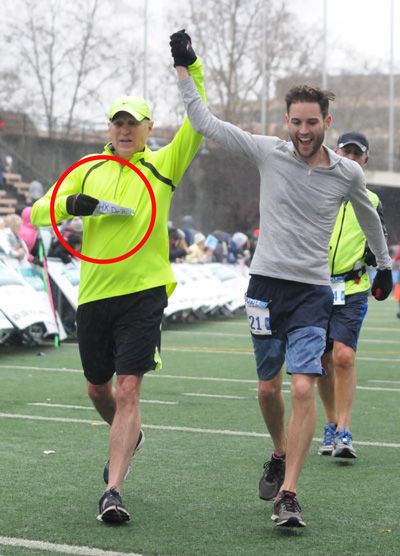
Technology Update: What Should Patients Know About Transcatheter Mitral Valve Therapy?
By Adam Pick on December 9, 2016
I get a lot of great questions and phone calls about transcatheter mitral valve therapy. So, at the recent Heart Valve Summit, I sat down with Dr. Steven Bolling to help all of us learn the latest updates about transcatheter mitral valve repair and replacement technologies.
Why Dr. Bolling? Well… Dr. Steve Bolling is the Director of the Mitral Valve Center at the University of Michigan. During his career, Dr. Bolling has performed over 5,000 heart valve procedures. You should also know that Dr. Bolling has been a huge supporter of our community and Dr. Bolling has successfully treated bunches of patients from our community including Jeff Adams, George Parrish and Linda Comai. Here’s the highlights from my interview with Dr. Bolling:
This 91-Year Old Patient & Dr. Mack Did What???
By Adam Pick on November 22, 2016
One thing I love about being a part of this community is seeing and hearing wonderful patient stories. I often tell Robyn, my wife, I’m constantly “TMI’d” by this community. (So you know, the acronym TMI, in our family, means touched, moved and inspired. 🙂 )
Well… I was just TMI’d again thanks to Tony Taddeo, a 91-year old heart valve patient, and Dr. Michael Mack, his cardiac surgeon. If you are ready for a little TMI, please watch Tony’s video below:
Many thanks to Tony Taddeo for being such an inspiration to our community!!! Also, we would like to thank Dr. Michael Mack and his awesome team at The Heart Hospital Baylor Plano for their excellent care of Tony!!!
Keep on tickin’ Tony!
Adam
Free eBook: What are the Latest Advances in Transcatheter Heart Valve Therapy?
By Adam Pick on November 16, 2016
Great news! Our webinar, “Advances in Transcatheter Heart Valve Surgery”, was amazing! During this online event, over 150 patients connected live with Dr. McCarthy, Dr. Davidson, Dr. Malaisrie and me.
If you missed the webinar, you can now download the free eBook by clicking here.
Watch the Webinar Live!
In addition to the eBook, you can also watch the webinar that was filmed live.
On behalf our community, many, many, many thanks to Dr. Patrick McCarthy, Dr. Charles Davidson, Dr. Chris Malaisrie, Jane Kruse, Barbara Garren and the entire Northwestern Medicine team for coming together for this wonderful community event.
Keep on tickin!
Adam
CDC Update: What Should You Know About Heater Cooler Machines, Infections & Heart Surgery?
By Adam Pick on November 8, 2016
In case you missed it… There was a very important CDC update recently that addressed a potential link between heater cooler machines and infections for heart surgery patients. My goal with this post is not to alarm you. Instead, with the help of Dr. Raymond Singer and the CDC, I want to educate you about this development.
That said, I filmed this video with Dr. Singer to discuss several key points that patients should know about heater cooler units and a potential infection that results from nontuberculous mycobacteria. For more, watch this video…
In addition to the Dr. Singer’s comments, I also wanted to share this video that was posted by the CDC about heater cooler machines and the potential bacteria that may infect heart valves.
What Does Your Aortic Valve Look Like in 3D?
By Adam Pick on October 24, 2016
I’m just getting back from the Heart Valve Summit in Chicago. It’s an amazing conference where hundreds of surgeons, cardiologists, nurses and medical device companies gather to discuss the best practices for heart valve management and therapy.
While there, I was very lucky to see how 3D echocardiograms are helping doctors before, during and after surgery. As you will hear from Christine Wagner, a product application specialist with Philips Ultrasound, these images were taken using a transesophageal echocardiogram, also known as a 3D-TEE.
Thanks so much to Christine and Philips for all the great work they are doing to help the surgeons help us patients!!!
Keep on tickin!
Adam
P.S. For the hearing impaired members of our community, here is a written transcript of the video with Christine Wagner.
Christine: Hi, I’m Christine Wagner, a product application specialist for Phillips Ultrasound. I want to describe what you’re seeing on the screen here. This is a 3D TEE, and it is an en face view of the aortic valve. You can see all three cusps here. You’ll see this little black line there, which is a coronary artery. By using this technology, we are able to see not only exquisite detail, but I can rotate this image around. I can see it from the front and the back. It allows us to give such detailed information to our surgeons that they were really never able to have before, both pre and during an aortic valve procedure.
Interviewer: Wow. Thanks so much, Christine.
Christine: You’re welcome.
Interviewer: We really appreciate it.
Surgeon Q&A: Can an Aortic Valve Replacement Fit in the Mitral Position?
By Adam Pick on October 17, 2016
I just received a great question from Dorothy about heart valve replacements. Dorothy asked me, “Hi Adam, Why can some of the newer valves, like the Perceval and Trifecta GT, only be used in the aortic position and not the mitral? If those valves are new and good shouldn’t they be used in the mitral position as well? I have moderate mitral stenosis. Thanks Adam!”
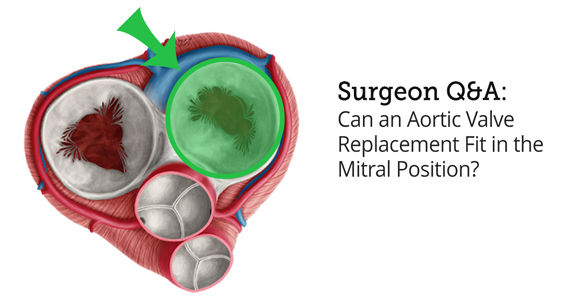
Happy World Heart Day! Join Me Now At Facebook!
By Adam Pick on September 29, 2016
Happy World Heart Day!!!!
If you didn’t know, this wonderful campaign was started by the World Heart Federation to raise global awareness for cardiovascular disease. To support this effort, HeartValveSurgery.com just launched an interactive, all-day campaign to elevate awareness to heart valve disease. To join me, please visit and like our Facebook page.
Thanks to the World Heart Federation and our wonderful community for being a part of World Heart Day! I hope to see you over at Facebook!
Keep on tickin!
Adam
Rush University Medical Center Launches Heart Valve Microsite!
By Adam Pick on September 29, 2016
I am very excited to announce that Rush University Medical Center (Rush) just launched a Heart Valve Microsite at HeartValveSurgery.com!
Rush, which is located in Chicago, is taking a unique approach to heart disease. The Rush Center for Adult Structural Heart Disease, was developed to offer patients a wide range of treatment options for all types of valve disease in adults. Using a heart team approach, each patient meets with a team of specialists to determine the best treatment for diseases including aortic stenosis, mitral valve prolapse and pulmonary stenosis. See the new Rush Valve Microsite.
Surgeon Q&A: What Are 8 Important Facts About Calcified Heart Valves?
By Adam Pick on September 15, 2016
I’ll never forget when my cardiologist said to me, “Adam, The calcium on your valve is causing serious problems. Your valve is stenotic. You need a new valve.” In that moment, I was overwhelmed with emotions and… questions. Some of the questions were, “What do you mean calcium on the valve?” and “What is stenosis?” and “OMG! Do I really need heart surgery?”
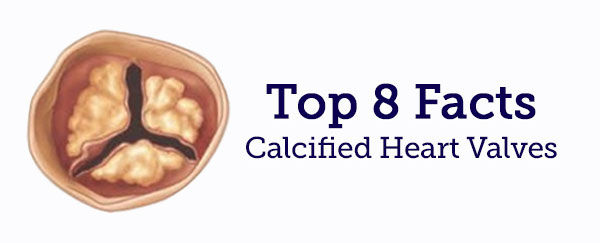
Ten years after surgery, I’m thrilled to report that my aortic valve replacement is doing great. That said, I receive a lot of excellent questions from our community about heart valve calcification. So, I wanted to create a special post dedicated to this very important topic.
